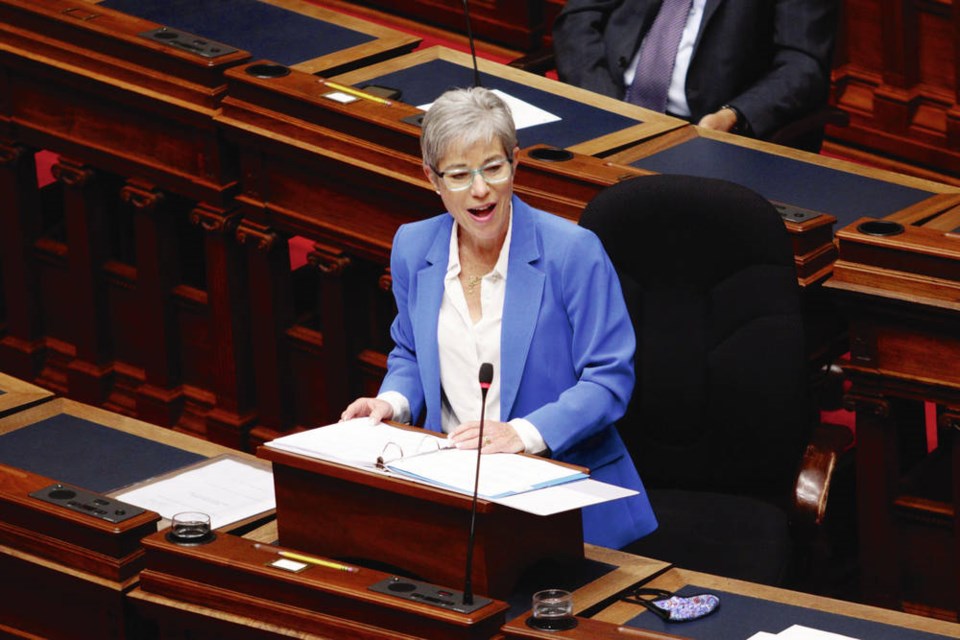Once homeowners have regained their composure (sitting quietly and breathing into a paper bag makes the dizziness go away), the expert report on housing supply is worth considering in detail.
But people will have to get over the initial jolts from the one-two punch in the part about evening up government treatment of renters compared to owners. First, it recommends eliminating B.C.’s 64-year-old Home Owner Grant, that box on the tax bill that lops several hundred dollars off annual property taxes for people who own their residences.
Then it discusses the unfairness of the capital gains tax exemption on the sale of principal residences and recommends the federal government take a hard look at it.
“Capital gains tax exemption” is such a boring phrase. Think of it instead as government considering seizing a chunk of the lifetime equity you’ve built up in your home the instant you sell it. That helps bring the concept to life.
Federal and provincial finance ministers Chrystia Freeland and Selina Robinson looked like a two-woman bucket brigade as they tried to dampen down the firestorms those two ideas would create.
Freeland issued a news release moments after the “Canada-B.C. expert report on the future of housing supply and affordability” was released saying the Liberal government is not considering any such tax.
Robinson happened to be standing in the legislature when the report dropped, so it was the perfect time for the incredulous Opposition to ask her if she was going to eliminate the Home Owner Grant.
“I can absolutely assure… we are not interested in making any changes to the homeowner grant,” she said. Robinson also cited Freeland’s similar response to the idea of taxing sales of principal residences.
The NDP — which commissioned the joint report — posted it in an obscure part of the government’s website but has not yet issued a release about it, as it did with an innocuous interim report earlier.
The wording in the report suggests the authors knew the grant and tax ideas would go nowhere. (“It would require strong leadership.”) The report also said “in the absence of changes,” new tax advantages should be created for renters to even the score.
“Our report is not intended to actively discourage homeownership. Rather… to achieve more equitable treatment of renters relative to homeowners.”
The report says a big problem created, reflected and perpetuated in B.C.’s housing market is the stratification of wealth by mode of housing.
Homeowners have higher incomes and net worth than renters. And the hotter the market gets, the more the disparities grow.
Since homeowners make up 70 per cent of residents, partly due to all the incentives governments introduced since the Second World War, they “also have considerable political influence, as they form the largest voting bloc … and tend to have higher turnout than renters in local elections.
“This, in turn, is exacerbating housing shortages and the inequalities they accentuate.”
Now the report says it’s like a game of musical chairs — people with the most money get first choice at the biggest selection of chairs. The less affluent get the least choice.
“Boosting the supply of housing is like adding another chair in each round, rather than taking one away.”
The word “supply” in the panel’s title is key, as most of its work focused on how governments affect housing supply.
The panel wants governments to reduce development costs and cut the lengthy approval times.
It raps the “over-reliance” on public hearings to make land-use decisions. They create perceptions of majority opposition to new developments that aren’t necessarily accurate.
“Those who stand to benefit from new housing supply often do not attend …”
It said public hearings contribute to restricting or impeding growth and allow anti-development interests to apply disproportionate pressure …”
The two headline-grabbing ideas are apparently dead on arrival.
So governments wanting to address the inequities will have to bulk up supports for renters, rather than reduce supports for homeowners.
Premier John Horgan promised a $400 renters rebate two elections ago, but it didn’t show up during the minority government and hasn’t happened yet.
As for increasing supply, there are a number of ideas the NDP could impose on municipalities if it wanted to get pushy.
But remember the panel’s observation: “It would take strong leadership.”



